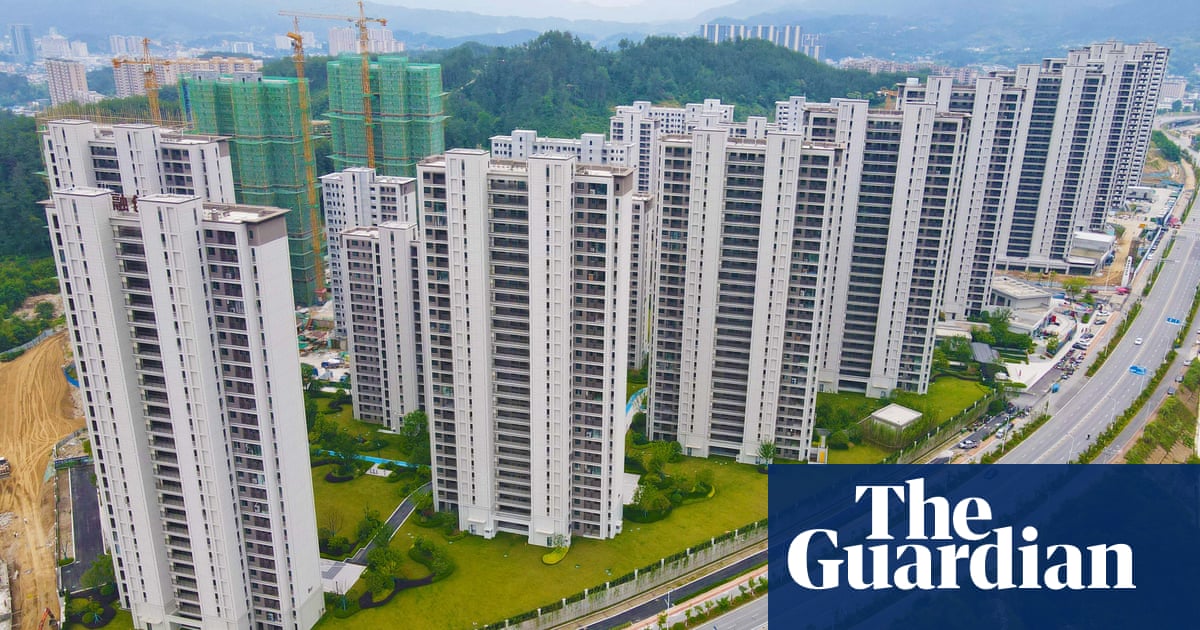- cross-posted to:
- worldnewsnonus@lemy.lol
- cross-posted to:
- worldnewsnonus@lemy.lol
The industry that has traditionally powered about a quarter of GDP has been in a downward spiral that policymakers have struggled to halt
All across China, from Beijing in the north, to Shenzhen in the south, millions of newly built homes stand empty and unwanted. There were nearly 391m sq metres of unsold residential property in China as of April, according to the National Bureau of Statistics. That is the equivalent of Manchester and Birmingham combined – and then some – sitting as vacant, unwanted property.
This glut of idle property has caused a headache for the government, shaken the world’s second largest economy and raised tensions over the purpose of housebuilding in a nation where property investment had been viewed as a safe bet.
Since the real estate sector was sent into a tailspin in 2020, caused by the pandemic and a sudden regulatory crackdown, the industry that has traditionally powered about one-quarter of GDP has been in a downward spiral that policymakers have struggled to halt.
The crux of the problem is that, with shaky faith in the economy and big property developers failing to deliver on paid-for apartments, potential homebuyers are keeping their money out of the market.



Local stimulus, which differs from Central government policy because contrary to popular belief the Chinese government is not a monolith. Different provinces want to get investment at the cost of other provinces, but this does not change the fact that in aggregate China’s bubble is actively being deflated by the actions of the central government. The prevailing trajectory of the market, and the actions which the central government have taken in this regard, are very clear. In modern terms, this is “picking up pennies in front of a freight train.”
sigh do you know what the minimum down payment for a home in central Beijing is? 50%.
Give me an action that indicates the central government is not trying to institute a controlled collapse (“soft landing”) of the real estate market. The numbers don’t lie, but apparently you do.
Let’s remember where this all starts from. The other poster said that if it tanks, people lose everything. You are now talking deflating the market softly, which indicates it is a bubble and that they are just trying to let the air out slowly. And ultimately, the top level point still stands: people are going to lose money, whether that be quickly or slowly.
Whether the the government is trying to “softly deflate it” or keep it growing (I suspect the latter, because again people losing all of their money in things the government has been encouraging and pumping up for decades is not a great look for them), they are propping it up, because letting the bubble burst would be a disaster.
It’s funny that you call me a liar, but then state that this has nothing to do with the central government, and then turn around and quote something from the article that is talking about the central bank of the country. lol You think see dishonesty in me because you know you are being dishonest.
How does lowering down payment requirements from 50% (!!!) prop up a market? It tweaks the demand curve a tiny bit, but like I said it’s towards engineering a soft landing. I told you that the central government is trying to engineer a soft landing. What evidence do you have that disproves this?
Investors (who could afford to buy multiple homes) lose money. How terrible.
Really? This is an easy one: it opens to more people buying.
I get that this is your talking point and you’re going to keep repeating it. But, again, it seems that the government, both local and central, are doing something to stop these people from losing money. Whether you think this is good or bad is inconsequential, clearly the government at all levels in China believes it’s bad, which is why they are making moves to stop it.